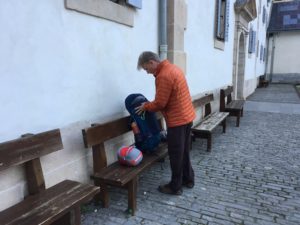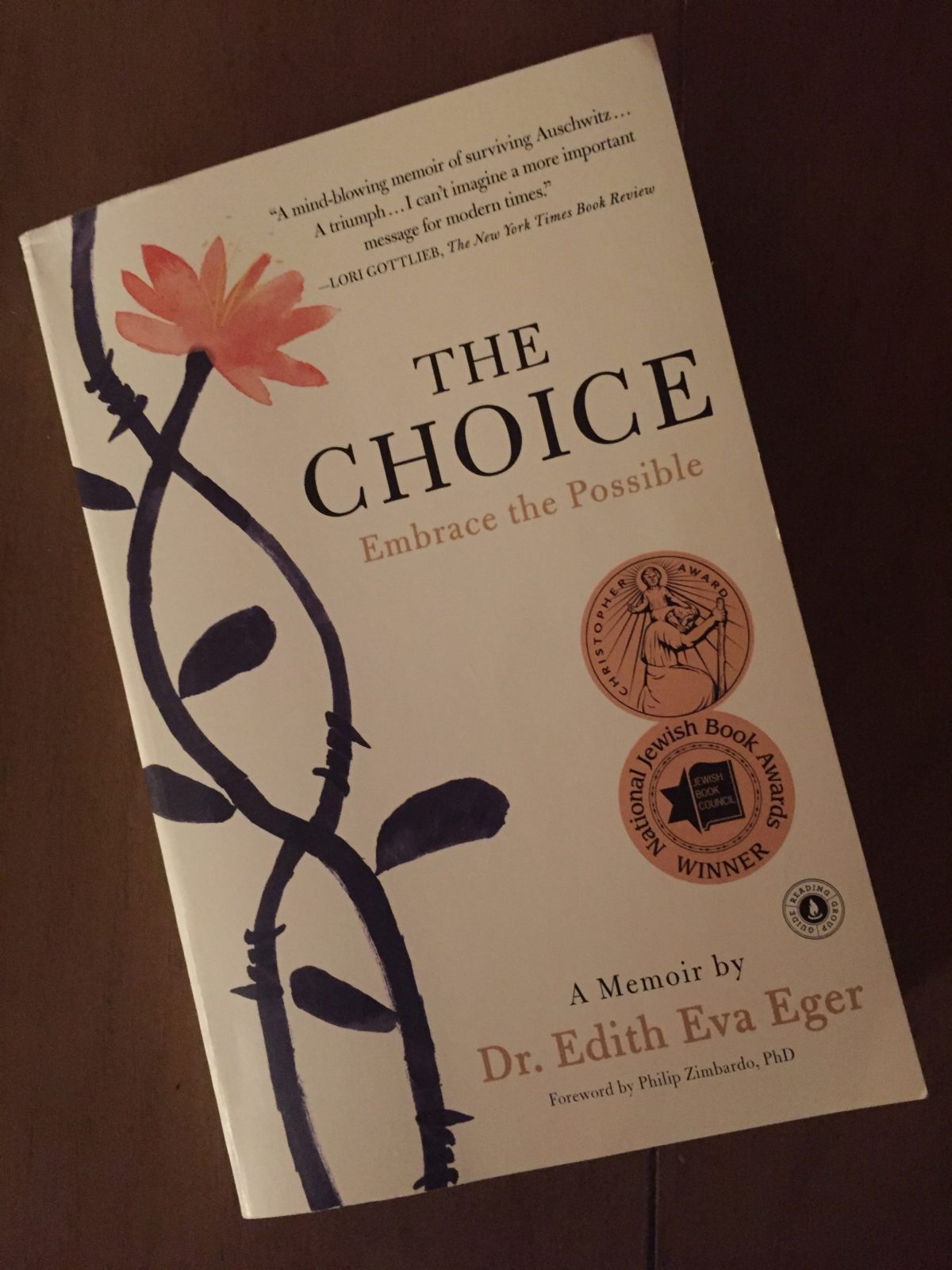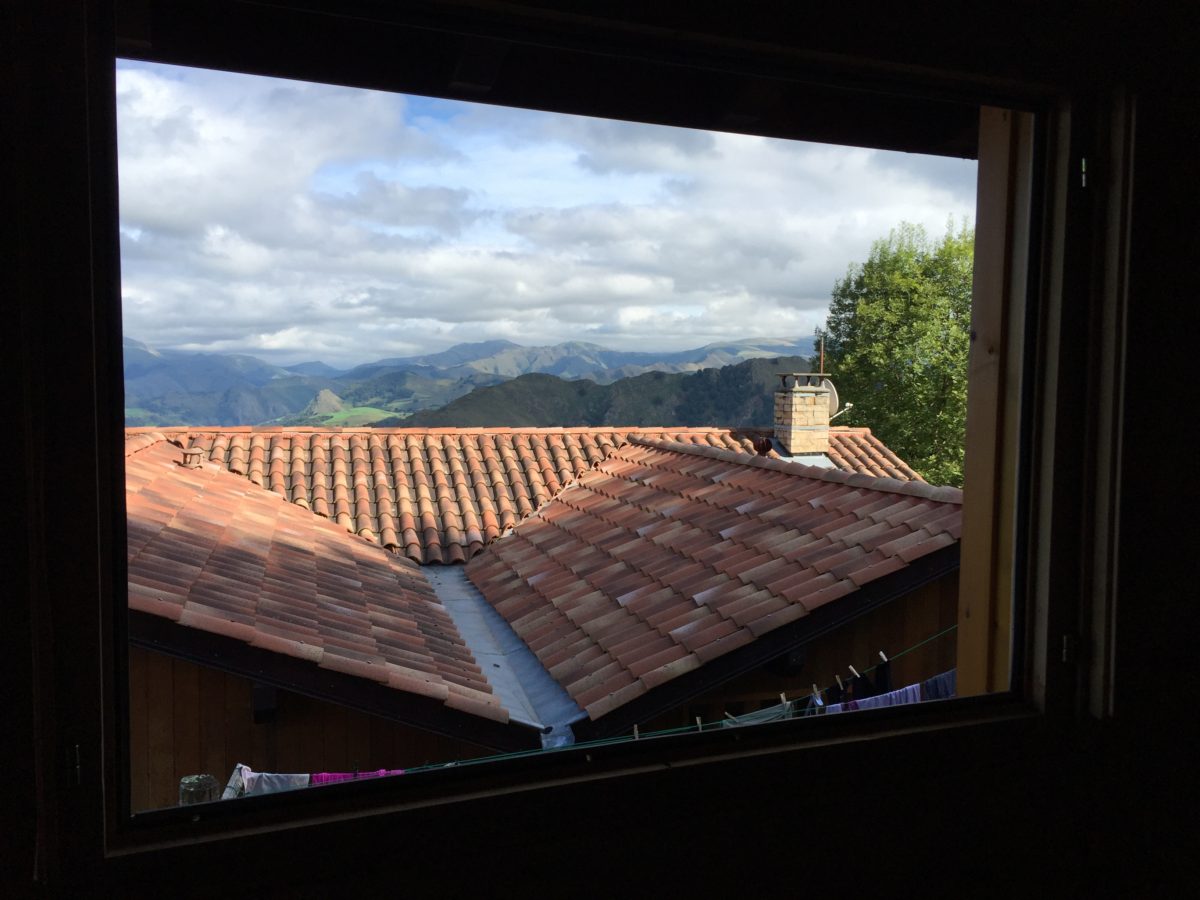One of the biggest things I miss about being on the Camino de Santiago is that I’m no longer outside as much as I was when walking it. I’m inside. Too much. All that fresh air, sunshine, the varied terrain, endless views, and those interesting cloud formations to enjoy and revitalize me.
So that’s one of the ways I’m continuing my Camino here at home. I’m making a point of getting outside more often. Taking my ten-minutes from writing breaks outside. Feasting on the cooler weather, the backyard plants that have busted out in uniquely fall foliage and flowers, the brilliant green baby grass sprigs that have exploded from the ground. Then there are the songbirds that have returned from their summer mountain escape to feed at my feeders. The animal life outside the walls of my home is busy, and I’m enjoying witnessing it!
And I’m still walking.
But there are other ways Chris and I are continuing to maintain our new sense of freedom and peace.
Today I’ll give you three ways:
- Trying to maintain farmer hours.
We’d been trying to do this for about a year, but when we walked the Camino, we had to. And now we crave it!
The albergues (hostels strictly dedicated to Camino pilgrims) require the lights to be out by 10:00, (actually, they’re required by law to lock the doors and turn down the lights to ensure no late-night revelers crash the establishment and pilgrims can get some sleep). Many pilgrims wanted them out earlier, so they could hit the trail before dawn. So we developed the daily rhythm of rising with the sun (or the light switch being flicked to “on”) and beginning the winding down process right after dinner, which we usually ate around 7:00 to 7:30. (Although some blessed restaurants opened the dinner doors at 6:00 to accommodate us Westerners!)
One private home we stayed in (it was like a B&B for pilgrims) required the lights out at 9:00 because she had other tenants that needed to rise early.
Without television, computers, or phone WiFi (pronounced “Wee Fee” by some in Spain) to distract us, we wound down, read our maps and planned our next day’s route, and maybe chatted with other pilgrims. Sometimes we strolled around outside the hostel to enjoy the quiet or distance city lights before retiring to bed. Sometimes we scribbled thoughts in our journals.
At home, we’re making sure the computers are shut down at least an hour before bedtime and only necessary lights for maneuvering around the house or bedroom are left on. Since we don’t watch much television, that’s not a problem for us. But when we’ve been sitting on the couch watching it, we make sure it’s off at least an hour before bed too. (Football games that go to 11:00 PM not included!)
The cellphone is left in its hammock in the kitchen (Chris leaves his in the office room), and we don’t read emails, texts, or Internet articles online, or answer phone calls either. If I can, I even shut down the Internet connection. When Chris’s company uses the dead-of-night hours to load new programs on his computer, we can’t do this.)
For many reasons, we’ve always maintained a strict rule in our house that there are NO televisions in the bedrooms. Having one in a bedroom allows you to disassociate too easily from the rest of the family; it’s a serious sleep and body rhythm disrupter; and it ruins your husband-wife intimacy.
I’m sure you’ve read or heard the research: Keeping all the electronics going right up until bedtime, and often after you’ve gone to bed, ruins your sleep and causes sleep disturbances. Your body needs time to raise your melatonin levels to ensure good, healing, restorative sleep.
On the Camino, we got it!

- Preparing well for your day and making sure (as much as is possible with you) that you don’t rush to do anything!
On the Camino, if you weren’t prepared to pack up your backpack and leave the albergue at the designated (no excuses allowed or accepted) time, they locked the doors (8:00 AM in most), then you risked forgetting an item and getting off to a harried start.
I’m continuing that at home. If I can’t finish something in the time I have, I re-schedule it or plan to do when I know I have the time.
I resist allowing others to load up my time with things they think are “critical.” Most of the time they’re not. I don’t commit unless I feel a joy about doing it and know I have the time. Obviously some work requirements fall outside of this rule, especially in the joy department. But I’m also taking inventory on what gives me joy and a sense of purpose and what doesn’t, and that’s giving me more freedom (and reason) to choose what I do when.
In the simplest example, I don’t start a load of laundry at 9:00 at night, when I intend to be in bed by 9:30; or if I know I don’t have time to get the load washed, dried and properly hung up or folded to avoid wrinkles.
I don’t overschedule my day.
If I end up not being able to complete something I hoped to accomplish one day, I don’t stress about it. I move it to the next day’s schedule. Most of the time it’s not a critical, deadline-driven item. If it is, I make sure it gets done first, whether it’s my favorite thing to do or not.
I know, and am honest about, just how long it takes me to get ready to go some place.
On the Camino, Chris and I were able to whittle down our morning prep and backpack loading time to 45 minutes. But that amount of time felt rushed. An hour was more comfortable, so we planned for an hour. And then we rarely ran outside to rejoin the path. We’d stretch, survey the day, weather and our surroundings, smile at and chat with some passing pilgrims, make sure our water bottles were filled, our packs were comfortably situated on our backs, and our poles were in our hands. And then we’d decide if we wanted a café con leche and croissant before we got started, or would wait until a mid-morning break or the next town for those.
Back home I’m spending more time thinking about all of the items I need to gather together to accomplish my day and make it a success. Do I have everything I need to run the errands I plan to run? Have I put the necessary items in the car? (Like my grocery bags.) Can I consolidate errands on one day?
And the biggest, most effective question?
What can I do to make my day less stressful, less chaotic, more enjoyable, productive and successful?
Answering that question requires that I slow down and focus on what I’m doing and going to do. Where I’m going and how long I’m likely to be there. How long it actually takes to get there, without rushing or cutting others off in traffic. Making the journey itself enjoyable.
And another question I can ask myself is:
How much of the frustration and chaos in my life is my own fault, of my own doing, by my own hand?
Most of the time we have choices. We can set boundaries with others, and ourselves. When we don’t, we need to stop pointing the finger of blame at our bosses, our co-workers, our spouses and our kids. If we let them erase or move our boundaries, then we are likely the ones to blame for the pain, frustration and exhaustion it causes.
Which translates to: No whining allowed.
- Whatever I’m doing at the moment, no matter how small or insignificant it seems to be, I’m focusing entirely on what I’m doing.
Again, if getting up late and having to rush to prepare for your day and pack your backpack distracted you, you risked leaving something behind or starting your day feeling frantic and already physically and emotionally overwhelmed.
On the Camino, we got into the habit of planning two days out in advance. How far we planned to walk, the city where we would to spend the night. Then making sure we had lodgings secured someplace in that city.
That relieved us of the pressures (and potential mental distractions) of wondering what our day would look like, what we’d have time to see, whether or not we’d arrive in time to get a bed at a hostel (some are first-come, first served), and whether or not we’d have to walk all around that town to find an available room, or bed.
So now I’m on a mission to remove as many distractions as possible from life. Even the tiniest things that cause my brain to hiccup.
Like not reading the mail while I’m watching the news. Although I might use the commercial breaks for that.
And that includes reading text messages and emails. The only time the phone gets my attention during that time is if Chris or one of the boys calls.
Really enjoying folding the laundry and putting it in neat stacks, rather than haphazardly folding them and maybe leaving a heap of clean clothes on the bed because I got distracted by something else, or was trying to accomplish too many loads of laundry in a day or was too tired or frustrated by something else (like my ridiculously over-packed schedule) to really pay attention to doing a good job.
And not reading something (email, magazine, mail, etc.) while I’m talking to someone, telling them “Keep talking, I’m listening.” And focusing on my meal without reading mail or chatting on the phone. (For years studies have shown that people who pay attention to what they eat, really sit down, slow down and pay attention to their food slow down and eat far less and enjoy their food more.)
Focusing on cooking and preparing a meal instead of watching television (another place to not allow a television is in the kitchen). I’m even getting to the point where I don’t like the distraction of cooking at the stove and talking to someone—including Chris—simultaneously.
Have you ever seen a busy restaurant kitchen? It’s chaos and stress. I’ve determined that the quality and timeliness of my meals is in direct proportion to the amount of attention I give them.
I’m opting for quality and timeliness. It’s certainly allowing me more food preparation and cooking joy than I’ve ever experienced before!
One other positive benefit of being more deliberate and intentional with everything I do, including the laundry, is that I’m experiencing far fewer “now, what-did-I-come-in-this-room-for-again?” senior moments. Just another confirmation that it wasn’t so much my aging, shrinking brain as my lifestyle causing me such frustration, distraction and a sieve-like brain.
And it’s allowing me to enjoy devotion and prayer times with fewer distractions. My mind stays on topic. And I can really listen for, and to God. That’s the best benefit of all!
And you?
These steps might be no-brainers for you, things you’re already doing. If so, bravo!! I applaud you.
If not, consider trying them, or just one. Be deliberate. This is brain retraining, so you can learn new habits; make life more manageable and enjoyable. Less frustrating and overwhelming.
I think you’ll find that your mental, physical, emotional and spiritual health will improve!
NEXT FRIDAY I’ll give you some additional changes you might try. Including some of the Spanish lifestyle behaviors I think allows them to outrank us in longevity.
Until then, may you find joy in being focused and undistracted!
Blessings,
Andrea
May you prosper in all things and be in health, just as your soul prospers (3 John 2).
Photos by Andrea A Owan


